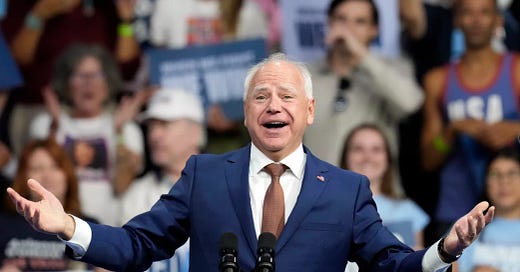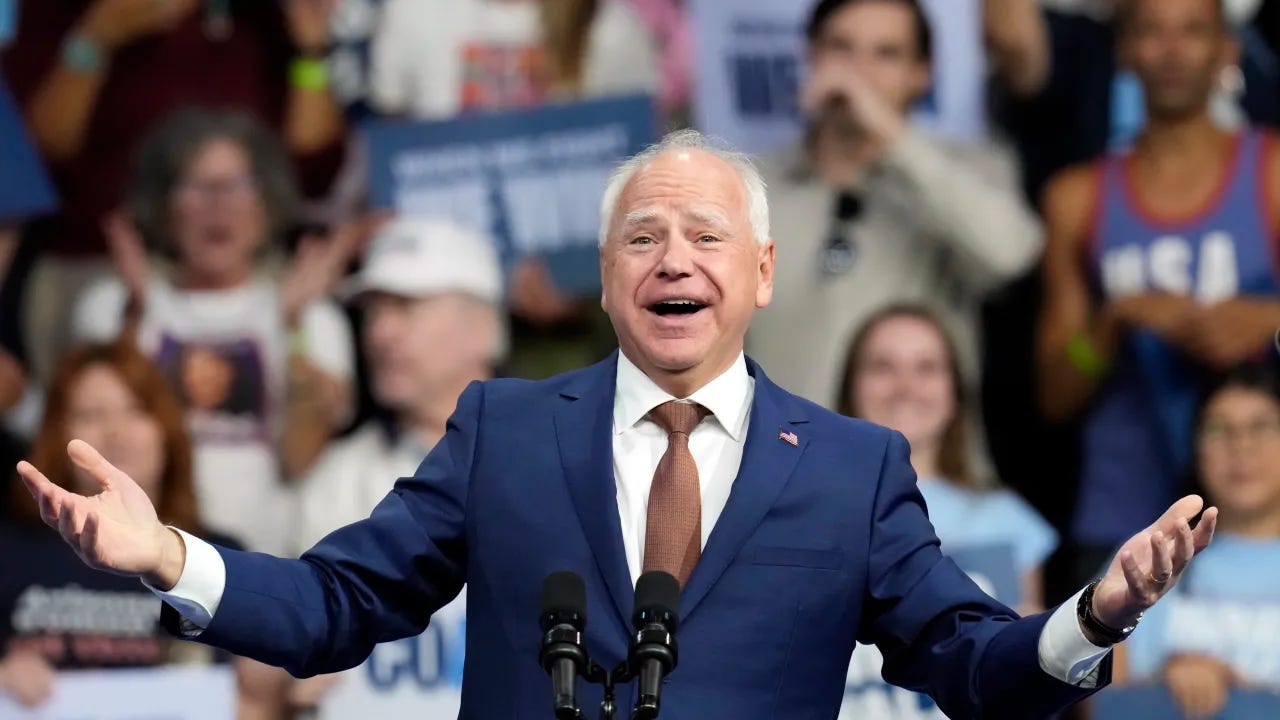They’ve tried to “swift boat” Minnesota Governor Tim Walz. It’s not working. And that’s exactly why he’s the perfect choice for Vice President.
On August 20, 2004 the New York Times ran an article titled “THE 2004 CAMPAIGN: ADVERTISING; Friendly Fire: The Birth of an Attack on Kerry.” A dark-money fueled group of rightwing operatives had fabricated the “Swift Boat Veterans for Truth” controversy smearing then Democratic presidential nominee John Kerry.
“Swift Boating” has since come to define the practice of turning a politician’s advantage against them, as was the case with Kerry’s strength (war hero of great character and conviction) becoming a weakness (dishonest, immoral deserter). Whether the attack is rooted in reality or invented out of whole cloth is immaterial, so long as it sticks.
Republicans have been swift boating ever since, to varying degrees of success. In the case of Walz, “swift boating” is not a generalized term—the GOP lobbed the same slander against both Walz and Kerry: military abandonment and stolen valor. Even the players are the same: hatchet man Chris LaCivita infamously engineered the 2004 strategy; he now leads Trump’s 2024 operation.
Republicans have gotten so comfortable swift-boating, it’s become second nature. Even before Harris picked Walz over Pennsylvania Governor Josh Shapiro, concern-trolls alleged an “antisemitism problem” among Democrats that would tank the Jewish governor’s chances.
Antisemitism is a very real and deeply serious challenge, but it reverberates from the heart of the white nationalist, conspiracist GOP. Jews and other voters imperiled by MAGA white nationalism vote Democratic, which is why Republicans try to swift-boat them on the wellbeing of ethnic and religious minorities.
This effort failed, as has the attempted swift-boating of Walz’s military career. The Harris team anticipated these attacks and aggressively mobilized an effective public relations counterstrategy, initially deploying surrogates to deftly dismantle the accusations. But when Walz ultimately stepped in to address the charges directly, he put on an absolute master class.
Over a short time the Minnesota governor has emerged as the vanguard on skillful communication, a beacon for his party.
As the ability to seize the narrative has been sorely lacking among Democrats for decades, it is nearly impossible to overestimate the value and potential impact of a generational talent like Walz.
Others have laid claim to that transformational prowess. Representative Dean Phillips (MN-3) pitched his 2024 presidential bid, in part, on this exact proposition: Democrats had allowed Republicans to dominate the narrative space, and Phillips was the guy to change all that. Except he wasn’t.
Tim Walz actually is that guy, and may well extend the proud Minnesotan Vice Presidential tradition: Walter Mondale under President Carter and Hubert Humphrey under President Johnson. Incidentally, Humphrey vanquished yet another Minnesotan—Senator Eugene McCarthy—on his way to the Democratic nomination in the tumultuous 1968 primary campaign.
But unlike the disastrous 1968, the 2024 campaign is sailing along almost miraculously well for Democrats. A star in her own right, Representative Alexandria Ocasio-Cortez (NY-14) celebrated the quick coalescence of party unity following the Walz selection by riffing on a perennial partisan lament: “Dems in disconcerting levels of array.” When everyone from AOC to Independent senator Joe Manchin (to a growing chorus of former Republican officials) are all rowing together, there’s reason to feel optimistic.
If trends continue, Democrats will win the presidency and possibly even slim majorities in congress. Walz and his statewide party’s impressive record of achievement under similar conditions suggests the ambitious agenda a Harris administration would pursue if elected, a de facto sea change in Democratic governance. “You don't win elections to bank political capital,” said Walz, “you win elections to burn political capital and improve lives.”
While Democrats have claimed the maxim that “good policy is good politics,” more often than not when in position to advance core policy objectives they have balked and played it safe. For too long, Democrats have assessed popular progressive or even liberal policies such as codifying abortion rights as political net negatives.
Walz is calling bullshit. And in choosing Walz, Harris has signaled to the electorate—and in particular to the progressive base—her confidence in the wisdom of his world view and governing philosophy. This radical departure in executive leadership both serves and is served by Walz’s countercultural rhetoric:
You can’t change the conversation if you don’t walk the walk and you can’t walk the walk if you don’t change the conversation.
Voters did not buy Hillary Clinton as the “progressive who likes to get things done” as she claimed, whereas Harris and Walz are poised to actually be, and do, just that. Owning the term “progressive” will be crucial to reclaiming the mantle of populism and replicating nationally Minnesota’s impressive record of achievements under Walz and his legislative allies. So too will shaping the narrative on Jewish safety be essential for maintaining focus on countering MAGA extremism and crafting a wiser, more humanitarian policy on the Middle East.
Walz won’t always be the front man in the years to come but he stands as an exemplar for the party and its movement allies. If elected, he will be uniquely positioned to shape policy and drive home the administration’s message both inside the party and in the public sphere.
If Harris wins in November, Walz’s viral line of attack against Trump and the GOP as “weird and creepy” will be recognized as the game-changer that upended the conversation and handed Harris an effective new line of attack. It will be the idea that first catapulted Walz to national stardom, then contributed to steering the country away from authoritarianism.
Trump first dominated his party by terrorizing everyone into submission; he then scaled out his campaign of demonization and intimidation to try and take over the country as a whole. Mindful that would-be strongmen thrive on fear and shrivel under mockery, Walz moved to disarm Trump and Vance by presenting them as a joke rather than a threat. He took their greatest advantage, their perceived strength, and turned it into their greatest weakness. He swift-boated them.





